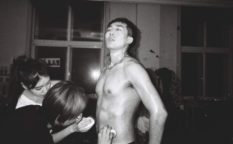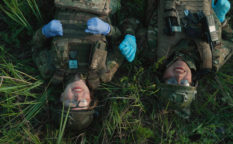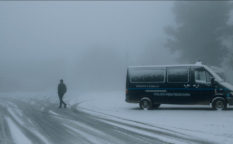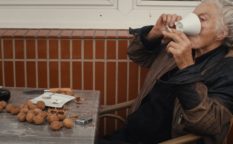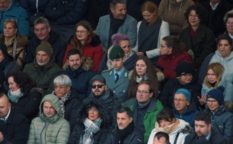Review: The Remains (2019), by Nathalie Borgers
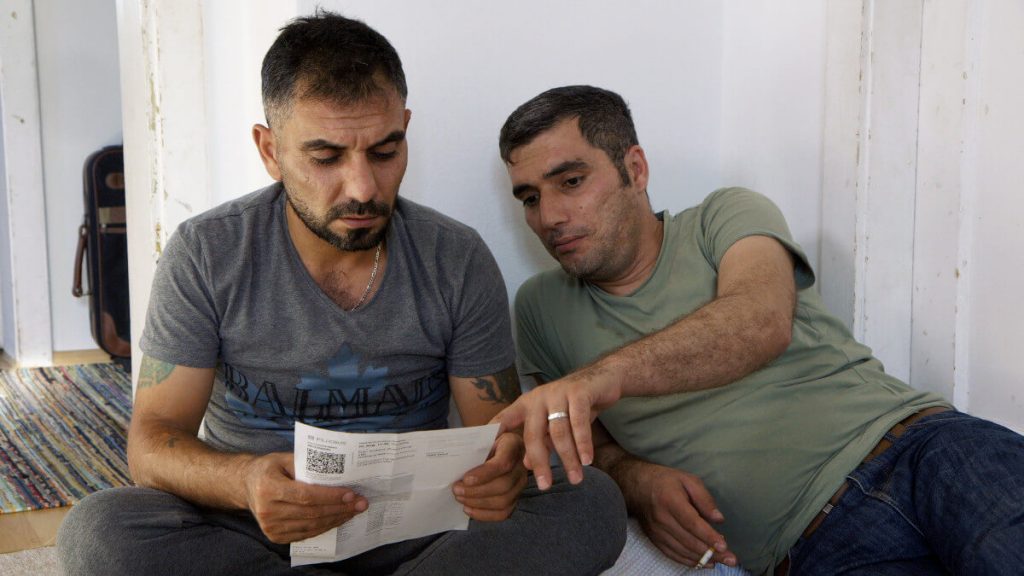
What is left after huge tragedies on the open sea, when refugees drown? Scattered along the rocky coastal part of the Greek island Lesbos are small, wracked boats and clothes, shoes, mobile phones and children toys. The coastal guard patrols daily, equipped with the infra-red light which reacts on the body temperature, thus able to spot anything that moves in the dark. Their goal is not to save, but to safe-guard. But here, the waters around the Greek Island of Lesbos are rough, cut through by massive sharp rocks, which make them a deadly trap for over-loaded refugee boats led straight into hell by the light cast by the lighthouse. One of the island’s inhabitants speaks of his attempts to save people from the water, saying how thousands have already lost their lives right there. He walks over to a memorial plaque remembering the victims of the accident that happened in October 2009, and his eyes cover with tears when he remembs a lifeless body of a little girl he pulled out of water.
The European borders are getting shut one after the other, and the refugees are kept under impossible conditions in over-crowded camps in CEE countries, trapped in the state of vacuum, without chances to work, to get a proper education or sometimes to even join with the rest of their families. In the meanwhile, the ship captain Pia Kemp and the Spanish firefighter Miguel Roldán Espinosa who helped save people from the Mediterranean Sea, are under the scrutiny of EU officials, with a high possibility of being incarcerated for their good deeds. It’s cynical that in the 21st century, in which the West prides itself for its advanced democracy based on human rights, the same are being stumped on, because it’s only “our” rights we care to worry about. The post-colonial thinking shows its true face in times of wide-spread xenophobia, with right-wing political parties rising to power across Europe, and the ridiculous rumours of “Europe flooded by refugees” who “live of the tax-payers money” make things even worse. Refugees are flooded on the shores of Europe indeed, but literally, their bodies being washed ashore of Turkish, Greek, and Italian coastline.

In The Remains- Nach der Odyssee that bagged the Grand Diagonale Prize of the Province of Styria for the Best Documentary (worth 15.000€), Nathalie Borgers shows a type of story unseen on television news, about those who disappear on the bottom of the sea. She follows a young Syrian couple who had lost 13 family members on their risky refuge over Mediterranean to the European shore. It’s a dramatic story that could belong to many thousands of refugees who lost someone dear, most probably their elderly family members or children, who normally get locked by the human smugglers in the underdeck area. Borgers follows the attempts by Farzat to at least unite with his brother, who was washed on the coast of another country, and therefore granted asylum in Illingen, Germany and not in Austria like the rest of the surviving family members. This proves to be an impossible task, despite of man’s heavy trauma and medical treatment due to the loss of his both children and his pregnant wife in the boat accident. “The doctor tells me this will help you sleep and forget your children, but how can I forget my children?”
With her documentary The Remains- Nach der Odyssee , Nathalie Borgers had tackled a very important topic, forgotten amidst other problems that refugees have to face in Europe. Families which went through terrible losses have no bones to burry, and no peace in sight. Human remains are collected, classified put in the same-looking type of graves, that the local Greek grave-carers are trying to embellish with whiter stones and nicely cut grass. Those who are luckier, might get a marble tomb-stones with their names engraved on them. Even this symbolic act requires a huge effort by the police and volunteers, who in Greece get workshops on how to map the human remains found along the coast.
A deep, highly emotional document of tragic destiny that one family met on their way to a new, “better” life, The Remains- Nach der Odyssee is an eye-opening film, shot in a sober, clear manner by Johannes Hammel and haunted by the weeping sound of the original score composed and performed by Özlem Bulut.
The Remains- Nach der Odyssee is a Navigator Film production, made with the financial support of Film Institute, Film Fonds Wien, FISA, Kahane Foundation and RD Foundation Vienna, and in association with the ORF.
Country: Austria
Language: German/ English/ Arabic
Runtime: 90 min.
Production: Navigator Film
Producers: Johannes Rosenberger, Johannes Holzhausen & Constantin Wulff
Script & Directing: Nathalie Borgers
Cinematograper: Johannes Hammel
Sound & Sound Design: Peter Rösner
Editing: Sophie Reiter
Original score “The Remains” composed and performed by Özlem Bulut











